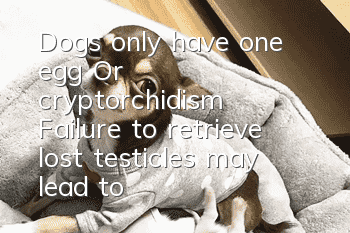Dogs only have one egg? Or cryptorchidism! Failure to retrieve lost testicles may lead to malignant tumors

Male dogs have two small bells on their butts. In fact, these two little bells are not present at birth. Generally speaking, a dog’s balls don’t fall into the scrotum until about 1 month old. But as some dogs age, they may only have one or even no eggs. Why is this? It may be that the dog’s balls are lost, leading to cryptorchidism.
What is canine cryptorchidism?
Normally, every male mammal will have two testicles. When the embryo is in the development stage, the testicles are located inside the abdominal cavity and behind the kidneys (about the same position as the ovaries). As they mature in the future, the testicles will move along the sperm. It fell into the scrotum due to the traction of the rope. Dogs are animals whose testicles fall into the scrotum relatively slowly. It takes about one month after birth for the testicles to fall into the scrotum. If the puppy’s testicles do not fall off when it is more than 6 months old, the owner should pay attention to whether the dog has cryptotestis. If the testicle is still not in the scrotum at 9 months of sexual maturity, it is cryptotestis.
About 6-12% of male dogs suffer from cryptorchidism, and the incidence rate is relatively high in small dogs. It is usually more common in toy dogs or short-nosed breeds, such as Maltese, Miniature Poodle, Pomeranian, Pekingese, Dachshund, Corgi, Pug, French Bulldog, English Bulldog and other dog breeds. Cryptotestes are divided into unilateral cryptorchidism and bilateral cryptorchid testes, and are further divided into groin cryptorchid testes and intra-abdominal cryptorchid testes according to their location. The groin testis is a subcutaneous testis and can be found through palpation. If the subcutaneous testis cannot be found during palpation, it means that there is a high probability that the testicle is in the abdominal cavity.
The hidden worries of canine cryptorchidism
Testicular tumors are one of the common tumors in male dogs. The incidence rate of dogs with cryptotestis is several times that of normal dogs. Intra-abdominal testicles are more dangerous than groin testicles. The reason is that the scrotum can maintain the most suitable environmental temperature for the testicles. However, because the testicles do not fall into the scrotum, the testicles are exposed to a temperature that is too high for a long time and can easily turn into malignant testicles. Tumor.
Therefore, when cryptorchidism is diagnosed, it is recommended to perform surgery to remove the testicles as soon as possible to avoid other complications caused by cryptorchidism. The most common complication of cryptorchidism is estrogen toxicity. After testicular tumorization, excessive estrogen may be secreted, leading to feminization of male dogs, such as bilateral symmetrical hair loss, skin pigmentation, and gynecomastia. If there is too much estrogen, it can also cause bone marrow suppression, resulting in pancytopenia and coagulation dysfunction.
Treatment of canine cryptorchidism
Since the cryptorchid testis is located deep in the abdominal cavity, and the cryptorchid testicles are usually small in size, it is difficult to determine the location of the testicles in the abdominal cavity. If traditional laparotomy is used, a large incision may be required, and the intestines and internal organs will be repeatedly turned during the process to find the hidden testes. Thanks to animal medicineWith the increasing advancement of technology, endoscopic minimally invasive surgery is now available.
The operation only involves two wounds of 0.3-0.5 cm in size, which greatly reduces pain, speeds up post-operative recovery, reduces the chance of infection, and does not require hospitalization. If absorbable sutures are used in the surgical wound and are bonded with surgical tissue glue, there is no need to remove the sutures. The wound can be recovered the next day, and postoperative care can become much easier.
Because cryptorchidism is easily hereditary, it is recommended that dogs be neutered. The benefits of sterilizing male dogs are not only to prevent the occurrence of testicular tumors, but also to reduce aggressive behavior, reduce the possibility of perianal adenomas, prostate problems, and perineal hernia in old age.
When the dog is young, the poop scooper should always "look at the crotch" and pay close attention to the dog's testicular fall! Don't laugh, this is not a sexual issue, but a health issue for the dog~
- Why does a dog keep barking at its owner?
- How to easily trim your pet’s nails
- How many months does it take to start dog training? How long does it take to train a dog?
- Precautions when weaning dogs
- Characteristics of the Shepherd Dog
- What is the best way to treat dog parvovirus?
- Do dogs really cry?
- What should I do if my golden retriever poops and urinates indiscriminately? Correct the golden retriever’s pooping and urinating habit!
- Precautions for feeding Schnauzer puppies
- How to train your own dog?



